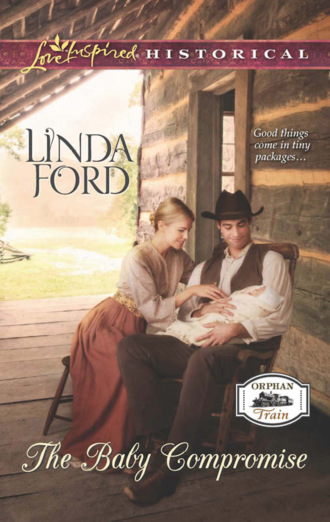
Полная версия
The Baby Compromise

A Bundle of Complications
Groomed for high society, Rebecca Sterling now has a new mission—to help the orphans coming to Evans Grove. Yet just before she’s due to return to New York, she faces two unexpected challenges. There’s the tiny infant abandoned on her orphanage steps…and the big, gruff cowboy who found him.
Colton Hayes knows nothing about babies and even less about pampered socialites. But as he and Rebecca work together to watch over little Gabriel, he comes to care deeply for them both. What can a rough-and-ready cowboy offer a woman made for city living? Except, perhaps, the dream dearest to both their hearts—a family built on faith and love.
“What about it, Miss Rebecca?” Colton asked.
“The orphanage may be your responsibility, but I’m the one who found this child—that makes him my responsibility.” The baby nestled in the crook of his arm. Before Rebecca or Heidi could stop him he grabbed the basket and headed for his horse.
“Besides, you don’t fool me. You don’t know any more about caring for the baby than I do. At least I have my ma at home to help.”
Rebecca stared at the retreating back. Technically the child was not her responsibility. But she couldn’t let him go. She shared something with the child—abandonment. She wanted to give the baby the care and love he deserved.
“Wait.”
He stopped, and turned slowly. “I’m taking this baby home.”
“I accept your offer. I think it would benefit us both to work together.”
He continued to study her without any change in his expression. Then he nodded. “Very well. Come along, then.”
Rebecca picked her way across the rough ground. Was it possible she’d agreed to work with him? Live in his house?
ORPHAN TRAIN:
Heading west to new families and forever love
Family Lessons—Allie Pleiter, April 2013
The Marriage Barter—Christine Johnson, May 2013
The Baby Compromise—Linda Ford, June 2013
LINDA FORD
lives on a ranch in Alberta, Canada. Growing up on the prairie and learning to notice the small details it hides gave her an appreciation for watching God at work in His creation. Her upbringing also included being taught to trust God in everything and through everything—a theme that resonates in her stories. Threads of another part of her life are found in her stories—her concern for children and their future. She and her husband raised fourteen children—four homemade, ten adopted. She currently shares her home and life with her husband, a grown son, a live-in paraplegic client and a continual (and welcome) stream of kids, kids-in-law, grandkids and assorted friends and relatives.
The Baby Compromise
Linda Ford

MILLS & BOON
Before you start reading, why not sign up?
Thank you for downloading this Mills & Boon book. If you want to hear about exclusive discounts, special offers and competitions, sign up to our email newsletter today!
SIGN ME UP!
Or simply visit
signup.millsandboon.co.uk
Mills & Boon emails are completely free to receive and you can unsubscribe at any time via the link in any email we send you.
I can do everything through him who gives me strength.
—Philippians 4:13
This story challenged me. It was because of the help of my critique partner, Debora Dale, that it has structure. Debora, with her wonderful grasp of story and her ability to sort out the tangled elements, lent her hand and guided me through the morass. I owe her a debt of gratitude. I can’t wait to see her stories published and on the shelves for all of you to enjoy.
Special thanks and acknowledgment to Linda Ford for her contribution to the Orphan Train miniseries.
Contents
Chapter One
Chapter Two
Chapter Three
Chapter Four
Chapter Five
Chapter Six
Chapter Seven
Chapter Eight
Chapter Nine
Chapter Ten
Chapter Eleven
Chapter Twelve
Chapter Thirteen
Chapter Fourteen
Chapter Fifteen
Chapter Sixteen
Chapter Seventeen
Chapter Eighteen
Chapter Nineteen
Chapter Twenty
Epilogue
Dear Reader
Questions for Discussion
Excerpt
Chapter One
Evans Grove, Nebraska
Late May, 1875
One day. He could spare one day away from home. He owed it to the people of Evans Grove to help with the construction of the town’s new orphanage. A single day wasn’t much, but it was something. The orphans rescued from the clutches of Felix Baxter deserved a safe place to call home.
But still, twenty-eight-year-old Colton Hayes paused at the door as he planted his favorite black cowboy hat firmly on his head.
“Ma, Pa, you’ll be okay until I get back?” He didn’t like to leave them alone.
“Those poor children need the orphanage as soon as they can get it,” Pa said. “You go do what you can to help.”
“I’ll try to make supper.” Ma had her long-suffering tone down to a fine art. Not that she didn’t have cause. Bearing him late in life had overtaxed her heart. From a young age, he’d done all he could to ease her burden.
“Don’t worry about it, Ma. I’ll make something when I get back. You two just take care of yourselves.” He’d be hungry after a day of work, but he had pork chops in the icebox. He’d learned long ago to boil potatoes in their jackets to save time.
“Pa, you need anything?”
“I’m fine, son.” And to prove it, he pushed up from his chair.
Before he could hobble more than a step, Colton leaped forward to take the cup from his trembling hands. Since his accident three years ago, Pa lived in constant pain that made walking almost impossible.
Knowing his stupidity had caused Pa’s injuries twisted Colton’s insides. He silently vowed yet again to take care of him the rest of his life.
Colton filled the cup and carried it back to the table beside Pa’s chair. “I’ve left soup on the stove. Ma, can you see that Pa gets a bowl of it?” He really should stay home and make sure they were both safe.
Ma sighed. “I ’spect I can manage, though I’ve been feeling poorly these past days.” She pressed a hand to her chest.
Colton studied her. Did pain deepen the lines on her face?
She waved wearily. “You go ahead. We’ll be fine.”
“I’ll be back later.” Still he hesitated, torn between his parents’ needs and the building project. “Seems we should help the community as much as we’re able,” he said, reminding himself why he’d made the commitment away from home. “After all, God spared us from the devastation of the flood.” A storm in the spring had caused the nearby dam to break, flooding the town, damaging many of the homes and businesses, and causing several deaths. Then, in hopes of ensnaring more children for his child-labor schemes, Baxter had started a fire that destroyed the school. Thankfully, his attempt to implicate the local orphans so the citizens of Evans Grove would send the children to Greenville had failed. The townspeople were pulling together to rebuild. Colton owed it to them to lend a hand.
Pa settled back in his chair with a muffled groan. “God truly spared us.” He lifted his hand in a half wave. “You go help out where you’re needed.”
Colton closed the door quietly, then turned toward town. One day to work. Then he’d be back home, taking care of his responsibilities.
He swung into the saddle and rode the few miles to town. He passed familiar homes, called a greeting to Mr. Gavin as he passed the general store. Like many of the homes and businesses in town, it still bore the mark of the high water of the flood.
He continued onward to the raw frame of the orphanage. Once it was finished, it would be a two-story structure with bedrooms upstairs for the children and staff. Rooms on the main floor would be used for daytime activity.
Strange. No one had arrived to work yet. He understood that men had volunteered and were scheduled to show up on specific days. Just as he had signed up to work today.
He studied the shell of the building. Wasn’t there supposed to be a stack of lumber nearby? Bought and paid for by the generous, yet anonymous, donor funding the project? The gift had everyone talking and guessing as to who the donor might be.
It would be interesting to know who had enough money to fund two building projects—both the orphanage and the school. But unless men showed up to work, the money would benefit no one.
He slipped from his horse, tied the reins to the nearest post and continued his inspection on foot.
As far as he could tell, there’d been nothing done since his last visit to town three days ago. He scratched his head. Moreover, it appeared as if someone had tried to knock out part of the framework where the front door would be. Was there something wrong with the work? He examined the braces and could see no flaw in the construction. Strange.
He circled the building to the back and stared. Someone had left a basket in front of the doorway. Laundry, by the look of it. Who would do that? And why? This whole thing was beginning to feel wrong.
He crossed the distance and squatted by the basket. Looked like... He lifted the first item. Bedding? Small bedding. What on earth?
The laundry in the basket moved. He jerked, almost losing his balance. Sucking in air to steady his twitching nerves, he gingerly plucked at the items. A cotton flannel square and then a quilt wrapped around—
Colton stared. A baby? He jolted upright and gave the surroundings an intent stare. Where was the mother? He saw no one nearby except Mr. Gavin sweeping the sidewalk in front of his store. Colton opened his mouth to call to him and demand if he knew anything, but he was too far away.
The baby made a mewling sound.
Colton squatted by the basket again. “Who are you?” He’d never seen such a tiny human before. He didn’t know much about babies—anything, really—but he suspected the infant couldn’t be more than a few days old. He touched the incredibly small, pink cheek. So soft. So warm.
Who did this baby belong to? He poked his fingers around the swaddled infant, looking for clues to the young one’s identity. He found a bottle full of milk, but nothing more.
Nothing except—
He examined the quilt bundled around the baby and realized that he recognized this pattern. No one made it but his grandmother. She said she’d dreamed it after Grandfather died. She called it “flowers of life.” Triangles of dark fabric formed the bottom half of the diamond and then a maze of bright fabric formed the top half. He had no idea how she managed to create such a beautiful design—one that looked like flowers growing from dark soil. No one else had ever managed to duplicate the pattern accurately. She had made this quilt—and she only gave quilts to family. That meant the baby belonged to the Hayes clan. He considered the relations who lived nearby.
Cousin Amelia lived in Evans Grove, but she was in Kansas visiting her sister. Although she had put on weight lately, he’d seen no indication that she had been expecting a baby. She certainly hadn’t mentioned anything to anyone. Colton might not get into town very often, but news like that would have reached him no matter what. Children were something to celebrate in Evans Grove, especially after so many had been lost to the flood. No, the child couldn’t be Amelia’s.
He had cousins in Ohio. Perhaps one of them had come to visit and something had happened. If Ma and Pa had been healthy, the mother might have left the baby with them instead of at the unfinished orphanage.
A fierce protectiveness filled his chest. He would take care of this little one until the parents returned. He reached into the basket, thinking to scoop the baby up, then hesitated. Wasn’t there a special way to hold tiny babies? He’d heard women mention it when they handed their infants to others, but he couldn’t recall their exact words. Something about holding its head. But how should he hold it? Up? Down? To the side? Was he meant to hold the baby from the head or support it from the neck? He pulled his hands back to his knees. He knew how to care for baby calves and foals. He’d seen baby kittens born, watched brand-new puppies. Once he’d even saved a nest of pink mice, only to watch them grow into troublesome rodents. But a human baby! He had no idea what to do.
Standing, he again looked around, hoping the mother had slipped away on an errand and would now be returning on hurried feet.
But only a pair of cowboys rode down the street. A wagon approached from the north side of town. Somewhere he heard a door slam. And distant voices laughing.
“Hello?”
The only answer came from the basket, a little squawk.
The baby’s face wrinkled up like a prune and a thin cry came from the tiny mouth.
Colton’s heart turned warm and soft. This lost or abandoned or forgotten baby was somehow connected to Colton and, as such, would receive all the care Colton could provide. Remembering the admonition to watch the head, he cupped his hands under the bundle and lifted it to his chest, hoping for the best.
“You’re safe now, baby. Don’t cry.”
The wee face smoothed. The lips puckered into a little rosebud, and the baby opened watery blue eyes to consider Colton.
Colton’s protectiveness grew fierce. Whatever had happened to this baby’s mother, he would find her. In the meantime, he would protect the baby and take care of it.
At that moment, the baby screwed up its face and cried—a sound like a mournful cat. So weak and pitiful Colton wondered if something was wrong.
“Don’t cry.” He cradled the baby against his chest and jiggled the little bundle.
“Don’t cry. Please, don’t cry.”
But the wails intensified. The baby sounded distraught.
What was he to do with such a tiny baby? Colton remembered the bottle and grabbed it. Stuck the nipple in the crying mouth.
The baby choked.
Colton’s face turned cold. His heart forgot to beat. In his ignorance had he drowned the wee mite?
* * *
Twenty-three-year-old Rebecca Sterling reminded herself to keep a cheerful smile and a hopeful heart as she headed down the street toward the orphanage. She was the one who had received the anonymous check, so she was the one in charge of the orphanage-building project, and she was determined to make it a success.
True, she knew nothing about building, but a year ago, she had known nothing about finding homes for orphan children, either. Her assignment with the Orphan Salvation Society—a New York–based organization that rescued orphaned city children from the streets and found families for them out West—had changed that in a hurry. Now all but one of the orphaned children placed in her care had been settled with families. The last child, ten-year-old Heidi Strauss, was at her side as they crossed the street to the orphanage building site. Half a block later, Rebecca’s heart sank and her smile faltered when she could see that no lumber had been delivered.
“No more wood,” Heidi announced.
“So I see.” No lumber. Things gone missing. Boards destroyed and made to look like an accident.
Someone didn’t want her to succeed at getting the orphanage built. Rebecca fought against her feelings of frustration. They were running out of time. The specially appointed U.S. marshal would soon return with the rescued orphans who’d been forced by Baxter into virtual slave labor for unscrupulous miners and farmers all over Nebraska territory.
The children deserved more than rescue. They deserved a warm place to live where they would be welcomed and protected. She intended to see that they got it. The orphanage would be built. Somehow.
She tucked her chin toward her chest in a sign that anyone who knew her would recognize as a sign of stubbornness. Whoever was at the root of her troubles would soon learn that Rebecca Gwendolyn Sterling expected people to do as she asked.
Her chin sagged. Here in small-town Nebraska, the name Lawrence Sterling III didn’t carry the weight it did back in New York. Few people here had heard of her father. Fewer knew or cared that he was a rich importer of European goods.
She again drew her chin back. She would not accept defeat.
Through the framework of the building, a dark figure lurched from side to side.
“Someone’s there,” Heidi whispered as she tugged on Rebecca to stop her.
Rebecca jerked to a halt and clung to Heidi’s hand. Was he the one responsible for the mischief at the site? Or was he there to help?
Realizing that she was alone except for the small girl, who squeezed her hand hard enough to numb her fingers, Rebecca glanced around, but saw no one. No one to help her...but no one to aid the intruder, either. There was only one of him, after all. No reason to be all trembly inside. She’d had enough of delays. If his intention was anything but working on the building...
A horse whinnied as she and Heidi trod past him.
A cry reached her ears. A thin wail. She stopped and listened. “What is that?”
Heidi listened, too. “It sounds like a baby.”
“Must be coming from an open window.” She moved on until she reached the corner of the framed building, where she paused to study the man. A big man, broad at the shoulders. Something stirred within her. A sense of recognition and more—a sense of eagerness and curiosity.
Nonsense. She pushed away everything but caution and determination. Whoever he was, whatever he was up to, she had a job to do on this building. It was time everyone involved realized that she was in charge and would not relent until her job was done.
“Come along,” she murmured to Heidi, who hung back, afraid of the man. Rebecca led her forward.
At that moment, the man turned.
Rebecca recognized him—Colton Hayes, a cowboy she’d seen in church, in the store, riding down the street, driving a buggy with an older man and woman she’d been informed were his parents.
Her admiration of the way he gently helped his parents from the buggy was her justification for why she’d studied him so intently. Noted his strong build, his thick black hair. The few times she’d seen him without the black cowboy hat he now wore, she’d noticed that his hair dipped in a wave. Today he wore a soft-looking blue shirt and denim trousers faded across the thighs, darker at the seams.
Surely he wasn’t the one responsible for the mischief.
Not a tall, handsome man like that.
He considered her across the distance. Too far for her to see the color of his eyes, though she knew they were as green as emeralds.
Rebecca Gwendolyn Sterling, have you taken leave of your senses? Staring shamelessly at a man? What would your father say? She scolded herself in her mother’s voice and words. Her mother had died seven years ago, yet Rebecca still heard her and listened to her. But that was not to say that she always followed what she knew would be her mother’s advice. If she heeded her mother, she would demurely approach the man and speak quietly and gently. Perhaps ask if he needed assistance. Instead, she lifted the hem of her navy blue skirt and stepped quickly and confidently across the rutted ground. She circled the corner and approached the man. Heidi followed on her heels, trying to be invisible behind Rebecca’s skirts.
“Am I ever glad to see you,” the rancher said at their approach.
She jerked to a halt. Confusion clouded her thoughts. What on earth did he mean? And what did he have in his arms? Something alive, if the movement inside the quilt indicated anything. The cry she’d noted before came from that bundle. The squalling intensified.
“What is that?”
His crooked grin seemed both amused and desperate, which didn’t make any sense. She couldn’t imagine this big, bold man uncertain or desperate about anything.
“It’s a baby.” His voice carried a definite note of tension. “A crying baby. I tried to give it a bottle but nearly choked it to death.”
“I see.” She didn’t. Why did he have a baby?
“Perhaps you can help.”
“Me?” Her voice squeaked and she swallowed hard, forced calmness to her words. “What would you like me to do?”
“I don’t know. Something. Anything.”
She closed the remaining distance and looked at the small, scrunched-up face. Two little fists quivered beside the red cheeks. “It’s very tiny.”
“I figure it can’t be very old.”
“Is it a boy or girl?”
He shook his head as he continued to jiggle the infant. “I don’t know.”
“How can you not know?”
He chuckled. “Maybe because I haven’t seen anything more than the bit that’s not wrapped up.”
“You mean to say—”
“I found it here in that basket. Can’t you make it stop crying?”
He expected her to know what to do? Of course he would. After all, as an agent for the Orphan Salvation Society, she was deemed an expert on children. Only one problem. Until her father had signed her up for this trip, she’d had very little to do with children except in the company of their mothers or older sisters. Never had she even seen a baby so tiny.
Still she told herself, I can do this.
She would do this. She’d prove to her father and everyone else—herself included—that she wasn’t simply a fancy lady from New York. She was capable.
He held the crying infant out to her.
Her heart thumped so hard she thought he might hear it. She sucked in a steadying breath. Hoping her arms wouldn’t shake noticeably, she took the baby. It was incredibly tiny. Somewhere deep in her being, a protective ache made itself known and she cradled the bundle close.
Heidi stood on tiptoe to peek around Rebecca’s shoulder. She pulled aside a corner of the quilt to look at the baby. “Oh, sweet,” she whispered. Then, as she realized Colton could see her, she ducked back out of sight.
Colton heaved a sigh that Rebecca took for relief. Obviously, he thought she could take care of the little one.
“Very well.” She could do this. “What does it need?”
He shrugged, though it seemed more like a gesture of uncertainty than lack of concern. “Beats me. But I suppose it’s hungry.”
“Then hand me the bottle, please.” She indicated the nursing bottle he held in one hand.
He did so. His fingers were long and firm-looking. A workingman’s hands. Hands that would grip life with an unrelenting grasp.
She pulled her thoughts back to reality and the heart-wrenching wails of the infant in her arms. She rocked. “Shh. Shh.” But the cries did not abate. What was wrong? What should she do? Steeling her face to reveal none of her fears, she shook the bottle then tipped the nipple into the open mouth.
The baby choked.
She jerked the bottle away. Oh, dear God, please don’t let this little one die. At that moment she wished some of her deportment lessons had been forgone for instruction in child care. But, of course, she was expected to follow her mother’s example and let her future children be raised by wet nurses and nannies. Rebecca recalled her nanny from when she was about five. When Miss Betsy left, she remembered crying for days until her mother had forbidden any more tears. Then she’d cried in private, often disappearing into a closet and shutting the door, hiding in the darkness.












